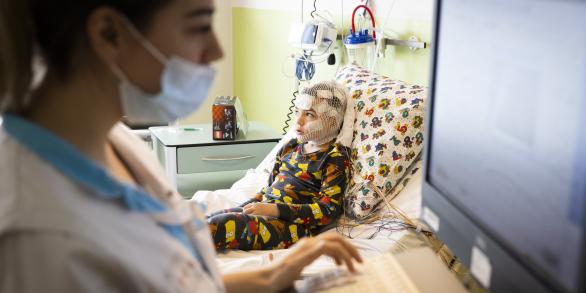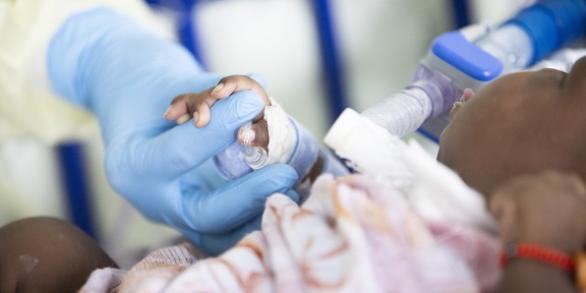Quality and the patient partnership
Our quality approach
Since its creation, the Children's Hospital has worked in the interests of the child and the adolescent. We believe that an active approach to continuous improvement, cooperation and respect are the only way to achieve the quality and dependability we desire for our patients. This is our defining philosophy as reflected in all our care missions and patient support, as well as in our health education and research and teaching.
The quality and patient safety approach is organised to obtain information on the basis of indicators that, once analysed, make it possible to improve care and treatment processes. This approach is at the heart of our institution and is apparent in all our departments and all our teams. More than an approach, it is a genuine philosophy for excellence of care.
Finally, the collecting of patients' opinions through satisfaction surveys is an essential indicator in measuring the quality of our care.

Monitoring indicators
The HUDERF uses a number of indicators for the purposes of regular self-assessment. A care quality and safety indicator is a tool with which to measure a state of health, a practice or an event. This assessment tool helps us in setting priorities and orienting our action plans for improvement. Indicator monitoring is a management tool to be applied in decision-making and when monitoring improvements.

Risk management
Our risk management policy aims to guarantee the safety of patients and staff, minimise error and undesirable events and improve care quality. It requires a proactive approach and cooperation between all members of the hospital team to create a safe and dependable environment.
2 Priority approaches
- Proactive and risk mapping
- Retrospective and management of undesirable events, complaints, etc. As a patient or loved one, you think you have suffered an undesirable event: clock HERE
How do I report a treatment incident?
We do our utmost to provide everyone with quality care, but we are also aware that incidents may occur during your child's stay in our hospital. It is important for us to be informed of these incidents so that we can improve and ensure that they do not happen again. Please report the incident using this form. You will be contacted by a member of the Quality Unit.
The Children's Hospital is committed not only to respecting but also to defending the rights of children and adolescents as patients. You can contact us in a number of different ways, all of which complement each other. Talking to the team treating you and/or requesting impartial mediation are also ways of doing this. All the feedback we receive is analysed and fed into our continuous improvement process.
The patient partnership at the HUDERF
The patient partnership at the HUDERF serves to encourage paediatric patients and their parents to be involved and take decisions within the care process by enabling them to develop competences and involving them in the continuous improvement in the quality of care and services.
This concept of a patient partnership for care is applied at three levels of the health system:
- in direct care (micro),
- in the organisation of services and governance at the HUDERF (meso)
- in drawing up health policy in partnership with patients (macro)
While always seeking to adapt to the level of maturity and development of the child and adolescent.
Central to the patient partnership is the participation of patients and accompaniers in improving care. The mission of the patient partner is to be involved in reflections around the patient experience and to become an active participant in reflections regarding the pertinence and coherence of research and training projects within the Children's Hospital and, more widely, within the Brussels University Hospital (H.U.B).
Accreditations and labels
Accreditation 1: In December 2022, the Children's Hospital was recognised for the second time for the quality and reliability of the services and care provided for children, adolescents and their families when it was awarded the GOLD label from the Canada International accreditation body. No fewer than 2,369 criteria were analysed. While in 2019 the commitment of staff to providing patients with an adapted care and to acting to improve quality and reliability was already stressed by the visiting team, three years later the visiting team highlighted the way in which continuous improvement was deeply rooted in the hospital culture, with the desire to integrate the child as central and strategic player in his or her care. The hospital obtained a global score of 96.7% as well as 97% for Platinum level criteria and 78.7% for Diamond level criteria. Its label is valid for three years, after which it will be evaluated again.
Accreditation 2: Since 2012 the Clinical Biology Laboratory has held ISO 15189 accreditation
Accreditation 3: Since 2015, the Oncology and Haematology Department and stem cell programme have held JACIE accreditation. This accreditation is the most important quality recognition for a European stem cell transplant programme.
Accreditation 4: Since 2012 the Pathological Anatomy Laboratory has held ISO 9001 accreditation.
Accreditation 5: Adhesion to the “Smoke-free hospital charter”
Accreditation 6: The University Paediatric Laboratory has held BELAC accreditation since 2018.
Label 1: The CHU Brugmann maternity unit, in cooperation with the HUDERF, has held the "Baby-Friendly Hospital” international label since 18 March 2009. Supporting, protecting and promoting breastfeeding are the main aims.
Label 2: The European Regional Development Fund (ERDF) made it possible to install 2,000 photovoltaic panels on the roofs of the Queen Fabiola Children's university Hospital. This project is part of a broad approach adopted since the 2000s to reduce the hospital's environmental impact, in cooperation with the Brugmann UH.
Label 3: The dietary kitchens benefit from automatic control by AFSCA, the federal agency for food chain safety.
Label 4: Since 2018 the HUDERF has been the ambassador hospital of the "Smoke-Free Generations" project to promote the creation of smoke-free areas among children and young people, in cooperation with the Anti-Cancer Foundation and a dozen healthcare organisations.